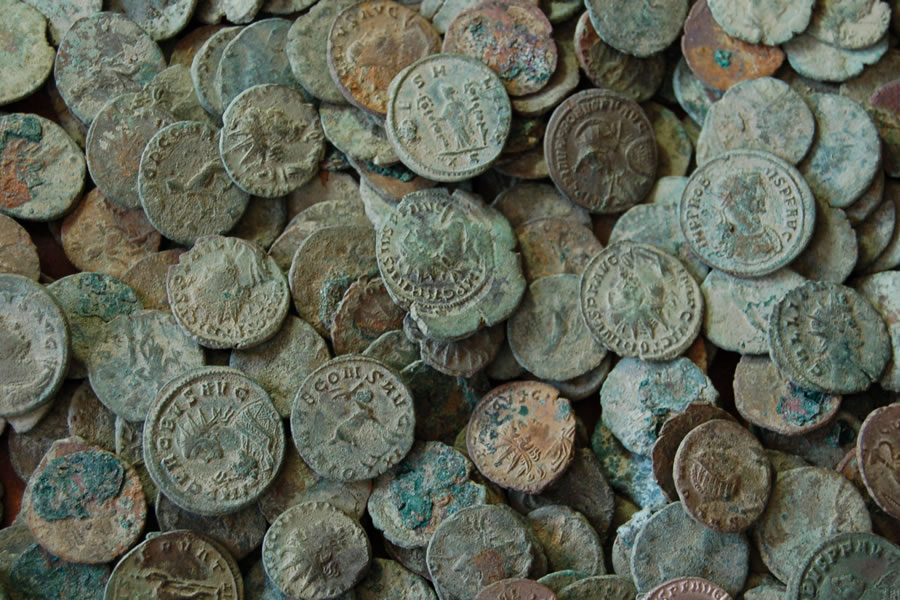
Caesar and the King
10-22-2023Weekly ReflectionDr. Scott HahnThe Lord is king over all the earth, as we sing in today's Psalm. Governments rise and fall by His permission, with no authority but that given from above (see John 19:11; Romans 13:1).
In effect, God says to every ruler what he tells King Cyrus in today's First Reading: "I have called you...though you knew me not."
The Lord raised up Cyrus to restore the Israelites from exile, and to rebuild Jerusalem (see Ezra 1:1-4). Throughout salvation history, God has used foreign rulers for the sake of His chosen people. Pharaoh's heart was hardened to reveal God's power (see Romans 9:17). Invading armies were used to punish Israel's sins (see 2 Maccabees 6:7-16).
The Roman occupation during Jesus' time was, in a similar way, a judgment on Israel's unfaithfulness. Jesus' famous words in today's Gospel: "Repay to Caesar" are a pointed reminder of this. And they call us, too, to keep our allegiances straight.
The Lord alone is our king. His kingdom is not of this world (see John 18:36) but it begins here in His Church, which tells of His glory among all peoples. Citizens of heaven (see Philippians 3:20), we are called to be a light to the world (see Matthew 5:14) - working in faith, laboring in love, and enduring in hope, as today's Epistle counsels.
We owe the government a concern for the common good, and obedience to laws - unless they conflict with God's commandments as interpreted by the Church (see Acts 5:29). But we owe God everything. The coin bears Caesar's image. But we bear God's own image (see Genesis 1:27). We owe Him our very lives - all our heart, mind, soul, and strength, offered as a living sacrifice of love (see Romans 12:1-2).
We should pray for our leaders, that like Cyrus they do God's will (see 1 Timothy 2:1-2) - until from the rising of the sun to its setting, all humanity knows that Jesus is Lord.
Comentario al Evangelio del Domingo
El Papa Francisco dice: “La referencia a la imagen de César, incisa en la moneda, dice que es justo sentirse ciudadanos del Estado de pleno título — con derechos y deberes—; pero simbólicamente hace pensar en otra imagen que está impresa en cada hombre: la imagen de Dios. Él es el Señor de todo y nosotros, que hemos sido creados «a su imagen» le pertenecemos ante todo a Él”.
La respuesta de Jesús a la cuestión ha sido un recurso frecuente para desarrollar la doctrina social de la Iglesia, que defiende tanto el ámbito civil, con sus derechos y deberes, como el ámbito eclesial, con los suyos propios. Se trata de dar al César, a la autoridad legítima, lo que le corresponde en justicia y, a la vez, defender los derechos de la Iglesia, sin emplearla en beneficio propio o mezclarla con fines meramente temporales.
A propósito de esta escena y hablando a cristianos que tienen que santificarse en medio del mundo, san Josemaría recomendaba vivir la unidad de vida, es decir, conjugar los deberes cívicos con los religiosos sin invadir ni negar el ámbito de ninguno de ellos. Decía pues: “ya veis que el dilema es antiguo, como clara e inequívoca es la respuesta del Maestro. No hay —no existe— una contraposición entre el servicio a Dios y el servicio a los hombres; entre el ejercicio de nuestros deberes y derechos cívicos, y los religiosos; entre el empeño por construir y mejorar la ciudad temporal, y el convencimiento de que pasamos por este mundo como camino que nos lleva a la patria celeste. (…)
BACK TO LIST